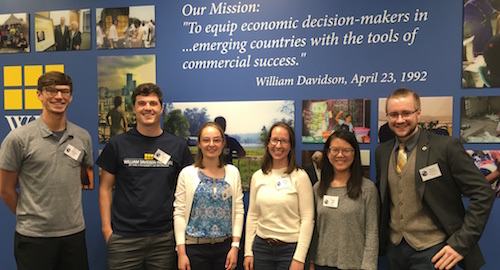
WDI’s 2018 summer interns before they set off on their voyages.
Over the years, WDI’s summer interns have faced unique challenges as they have conducted their work across the globe for the Institute and its partners. Impassable roads, extreme weather, the occasional wild animal. An active volcano can now be added to the list.
WDI intern Nadia Putri spent her summer in Bali, Indonesia working with East Bali Cashews on quality improvement projects, measuring the company’s impact on women and developing a U.S. market entry strategy. She also got an up close look at emergency preparedness.
“It was really beautiful, but a bit scary at the same time for someone who has never seen anything like it before,” she wrote of watching the sparks of lava and plume of smoke rise from the crater near where she was working. The cashew factory was outside the evacuation zone but management kept a daily eye on the volcano in case conditions changed. Earthquakes in the region have claimed nearly 400 lives during August.
Putri was one of six WDI interns working internationally this summer. Some, like Putri, have returned to the University of Michigan campus; others are finishing up their work and will be back in Ann Arbor soon. While overseas, the interns contributed to a blog to chronicle not only their work but also the experience of living in a foreign land. WDI has highlighted some of the work below and the full blog chronicling interns’ experiences is available here.
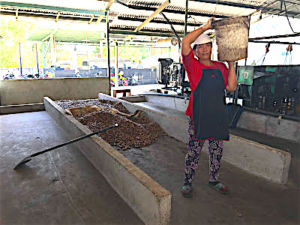
East Bali Cashews where Putri worked sources sustainably grown cashews from nearby smallholder farmers and processes them in a factory located in a remote village in one of Bali’s poorest regions. Since its launch in 2012, the company has integrated various social missions in and around its cashew processing operations, including community improvement and women’s empowerment.
Putri, a Ross School of Business MBA candidate, said factory workers were very supportive of her work and willing to explain how the company has impacted them. One employee recalled being hired after graduating from high school and is now in charge of 50 workers.
“At the factory, everyone is very welcoming and open to share their stories,” Putri wrote in her blog. “It’s especially humbling to see such high curiosity and willingness to learn from the factory employees. This serves as my daily reminder that (the) situation you grew up or lived in does not define who you could be.”
In Kenya, Andrea Arathoon, a School of Public Health graduate student, was tasked with helping a local maternity hospital reduce costs and increase patient volumes to achieve sustainability while also maintaining quality. One intervention Arathoon worked on for Jacaranda Maternity is a new outpatient care checklist for prenatal visits.
 The checklist is designed to improve patient processing within the outpatient clinic. This improved flow will reduce wait times and result in more efficient consultations, thus increasing patient volume and reducing costs, Arathoon wrote. She ensured the checklist followed the World Health Organization and Kenya Ministry of Health guidelines. The hospital’s doctors, nurses and administrative staff were consulted, and everyone was trained on how to properly use the new tool.
The checklist is designed to improve patient processing within the outpatient clinic. This improved flow will reduce wait times and result in more efficient consultations, thus increasing patient volume and reducing costs, Arathoon wrote. She ensured the checklist followed the World Health Organization and Kenya Ministry of Health guidelines. The hospital’s doctors, nurses and administrative staff were consulted, and everyone was trained on how to properly use the new tool.
“I am very excited about my summer project and the impact that it can have in improving maternity care for women and children in the country,” Arathoon wrote on the blog.
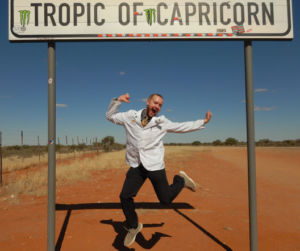
Across Africa on the Atlantic coast, Mason Benjamin is working in Namibia on pharmacy workforce development and hospital pharmacy practice. Benjamin, a College of Pharmacy graduate student, joined a collaborative project between WDI and the International Pharmaceutical Federation Hospital Pharmacy Section. The goal of the project, which includes the University of Namibia School of Pharmacy, is to increase the capacity of hospital pharmacists in Namibia through in-country diagnostics and technical assistance.
Benjamin has been traveling all across the country to visit hospital pharmacies in different regions to develop a landscape analysis of hospital pharmacy practices at both private and public hospitals. Before his site visits began, Benjamin attended the Medication Utilization Review In Africa (MURIA) conference, where he learned about pharmacy practice not only in Namibia but also across Africa.
“I was aware of how different the healthcare system in the United States might be from anywhere else in the world, but always felt that researching other systems online had its limits,” Benjamin wrote in the blog. “I much prefer to learn right from the source and in person, so I was grateful for the opportunity to ask questions to practicing pharmacists from over a dozen different African countries about how things worked in their setting.”
In India, the population of cities is expected to increase by 250 million people in the next 20 years, making employment a crucial need for the new transplants. Ross School of Business MBA student Chris Owen is working with MADE (Michigan Academy for the Development of Entrepreneurs) and its Madurai-based partner Poornatha, which is designing an affordable, world-class coaching curriculum for entrepreneurs in emerging economies. MADE was founded by WDI and U-M’s Zell Lurie Institute.
Owen is identifying best practices of existing coaching programs in India and other emerging economies, conducting a needs assessment of entrepreneurs in Madurai and developing a framework and training curriculum for how coaches will be identified, on-boarded and trained.
“By investing in strong local economies, India can address its dual-challenges of rapid urbanization and rising unemployment,” Owen wrote on the intern blog. “Indeed, for this reason, entrepreneurship in India – and the work of Poornatha – is becoming increasingly important.”
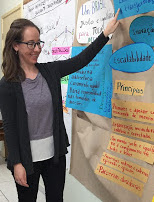 In Brazil, Rebecca Grossman-Kahn – a student at Ross and the U-M Medical School – is developing a tool to assess the social impact of the gender equality programs of Plan International’s Brazil office. Plan International has a long history of advocating for children’s rights but recently decided to focus its work in Brazil on promoting girls’ rights and equality. Gender roles in Brazil tend to be rigid and many girls stop studying in middle or high school to help with housework at home, Grossman-Kahn wrote on the blog. She attended a staff retreat to strategize on how to combat resistance from community members and organizations regarding Plan’s new focus on gender.
In Brazil, Rebecca Grossman-Kahn – a student at Ross and the U-M Medical School – is developing a tool to assess the social impact of the gender equality programs of Plan International’s Brazil office. Plan International has a long history of advocating for children’s rights but recently decided to focus its work in Brazil on promoting girls’ rights and equality. Gender roles in Brazil tend to be rigid and many girls stop studying in middle or high school to help with housework at home, Grossman-Kahn wrote on the blog. She attended a staff retreat to strategize on how to combat resistance from community members and organizations regarding Plan’s new focus on gender.
While at the retreat, a new World Bank report was released that showed girls who complete secondary education can expect to earn twice as much as those with no education.
“Studies like this can help get community leaders on board with Plan’s mission,” Grossman-Kahn wrote.
In Nepal, nearly two out of three working people are farmers. But the country’s rugged topography and lack of infrastructure makes it difficult to farm year-round despite a lengthy monsoon season. Additionally, in rural Nepal, only 5 percent of the population has reliable access to electricity. But the country has more than 300 days of sunshine, making it a perfect candidate for solar-powered agricultural services.
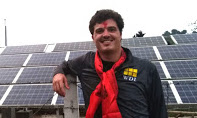 Matthew Carney, a dual degree student at Ross and the U-M School for Environment and Sustainability, spent the summer with the solar startup Ecoprise to help bring solar-powered agricultural services to subsistence farmers in the Terai region of Nepal that borders India. AgroHub, a pay-as-you-go service-based business model recently started by Ecoprise, provides access to solar-powered infrastructure for remote, underserved farming communities. These hubs provide farmers with access to equipment for irrigation, clean drinking water, food-processing and refrigerated post-harvest storage as a service.
Matthew Carney, a dual degree student at Ross and the U-M School for Environment and Sustainability, spent the summer with the solar startup Ecoprise to help bring solar-powered agricultural services to subsistence farmers in the Terai region of Nepal that borders India. AgroHub, a pay-as-you-go service-based business model recently started by Ecoprise, provides access to solar-powered infrastructure for remote, underserved farming communities. These hubs provide farmers with access to equipment for irrigation, clean drinking water, food-processing and refrigerated post-harvest storage as a service.
AgroHub has proved very successful for those farmers who have used it, allowing them to irrigate more land during the winter and monsoon seasons and reducing the use of diesel-powered water pumps that saves money. Carney’s task is to develop a plan to bring the service to farmers in western Nepal.
“Solar-powered agriculture presents an opportunity to raise the living standards of millions of rural Nepali farmers in a sustainable fashion,” he wrote. “It would be a shame to waste it.”
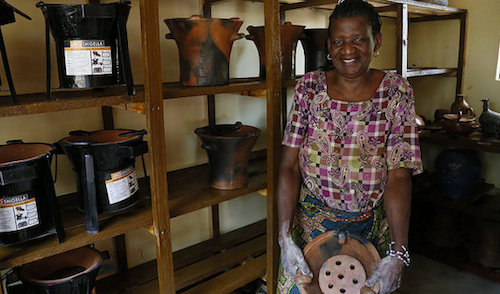
An article published in the Stanford Social Innovation Review website and written by two WDI researchers showcases a framework for accelerating impact industries, those made up of profit-seeking, scalable businesses that also seek to create substantial social and/or environmental impacts.
Written by Colm Fay, who leads WDI’s Scaling Impact and Energy initiatives, and WDI Senior Research Fellow Ted London, this piece features a conceptual framework developed while working on a 2017 study for the Global Alliance for Clean Cookstoves (“the Alliance”). The Alliance is a public-private partnership hosted by the United Nations Foundation that aims to save lives, protect the environment, and improve livelihoods through access to clean cooking solutions. The study sought to identify which of the Alliance’s strategies worked, which were less successful, and the lessons that could be learned through its work to build a new global market for clean cooking solutions. The resulting framework is designed to help Impact Industry Accelerators (“IIAs”) such as the Alliance assess the current state of an industry, compare it to a desired future state, and prioritize and choreograph their strategic planning activities and investments accordingly.
After conducting research and interviewing Alliance leadership and its partners in Washington, D.C., Kenya and Bangladesh, Fay and London identified four interconnected strategies related to accelerating investment, mobilizing collective action, increasing profitability and enhancing impact. Fay said he hopes the insights developed from this work are applicable not only to the Alliance, but that they can be adapted for use by other IIAs that target low-income populations.
The Alliance has already begun to leverage the framework. It recently contributed to a new report published by the Alliance and Accenture which explores business model and financing challenges and opportunities to drive scale and sustainability in the clean cooking sector.
“The Alliance has contributed to significant progress towards establishing a viable clean cooking industry, and has learned much along the way, making this a fitting time to re-assess this growing space, and our organization’s role in it,” said Peter George, director of Enterprise Development and Investment at the Alliance. “The WDI research has helped us evaluate our priorities and will allow us to more effectively support businesses and other sector actors as we continue to work toward our shared goals.”
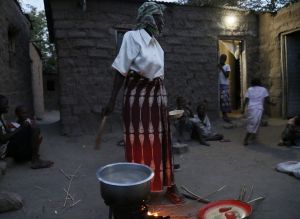
To achieve those goals, which include universal access to clean cooking solutions by 2030, the Alliance recognizes it must develop a sustainable industry that leverages mission-driven public resources to attract private sector innovation and capital. It is clear that while ambitious goals have been helpful in generating support for a cause, turning a vision of impact into reality can be challenging. This framework provides an approach that helps IIAs better identify, prioritize and choreograph their activities.
“We hope these insights lead to more constructive conversations between IIAs and their stakeholders that focus not just on milestones and deadlines, but on what needs to be done to accelerate an entire industry,” Fay said.
The Stanford Social Innovation Review is a quarterly magazine and website about social innovation published by the Stanford Center on Philanthropy and Civil Society at Stanford University.
Both images courtesy of Russell Watkins, Department for International Development (DFID).
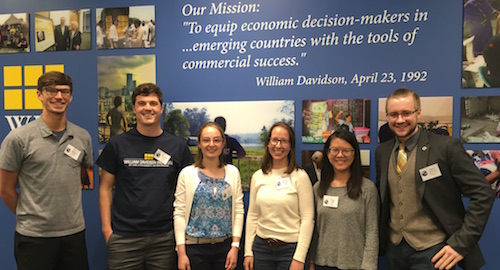
Six U-M graduate students are participating in the 2018 WDI Global Impact Internship program.
When Rebecca Grossman-Kahn was in high school, she was a volunteer with Amigos de las Américas, a youth leadership and cultural exchange program that partners with Plan International, a global development and humanitarian organization. While an undergrad at Stanford University, she worked in Honduras and Nicaragua for the organization.
“I just loved it,” she said. “I loved living in a different place, I loved speaking Spanish.”
So when the Ross School of Business MBA candidate and University of Michigan Medical School student was looking to create her own summer internship, she reached out to several organizations. The first to respond was Plan International, which works to empower children – especially girls.
“They were interested in revamping their evaluation program and I knew WDI worked in performance measurement,” Grossman-Kahn said.
She pitched the partnership to WDI as a student-initiated internship and it was approved. In mid-June, she will head to Brazil to develop a survey tool Plan International will use to assess the impact of their programs. In addition to student-initiated internships, WDI also develops student summer opportunities along with its partners.
Grossman-Kahn is one of six U-M graduate students participating in the 2018 WDI Global Impact Internship program. The students represent the Ross School of Business, the School of Public Health, the College of Pharmacy, the School for Environment and Sustainability (SEAS) and the Medical School. They will work in Brazil, India, Indonesia, Kenya, Namibia and Nepal, and support the work of WDI initiatives in Education and its Entrepreneurship Development Center, Energy, Healthcare, Performance Measurement and Scaling Impact. All of the interns have met with their respective WDI initiative leaders and will continue to keep in touch once in the field.
Colm Fay, who leads WDI’s Energy Initiative, said he is interested in understanding more about access to energy for productive use because of the impact it can have in low- and middle-income countries. Fay will be working with graduate student Matthew Carney, who will be interning at Ecoprise, which designs, builds and installs clean energy products in Nepal for energy-poor communities.
“Matt’s work with Ecoprise will provide important learnings about how an innovative business model to provide energy for agricultural loads can impact rural livelihoods, and how the well-being of these communities can be enhanced through greater access to energy,” Fay said.
Fay also directs WDI’s Scaling Impact initiative and is working on a project in Kenya with intern Andrea Arathoon. He said Scaling Impact wants to develop tools and frameworks that help enterprises achieve sustainability at scale.
“Andrea’s experience with Jacaranda, an organization that is seeking both to scale its operations as well as replicate its approach through partners, will further our understanding of the strategies and resources that are necessary to design business models for scale,” Fay said. “Her work will also provide great insights on how enterprises measure performance in terms of both sustainability and impact, and how best to frame this for investors.”
For Grossman-Kahn, her summer in Brazil will not be her first trip to the country. She lived there while participating in a study abroad program as an undergrad and learned Portuguese. She is looking forward to going back and collaborating with a familiar partner.
Grossman-Kahn said she will split her time between doing high-level strategy work in an office in Sao Paulo and observing Plan International’s programs in rural towns.
“I’m really excited about working with Plan International again,” she said. “They are really mission driven. Everyone in the organization is passionate about the work they’re doing.”
Here are the all WDI interns and their projects:
Andrea Arathoon
School of Public Health
Jacaranda Health
Nairobi, Kenya
WDI Partner: Scaling Impact initiative
Jacaranda Health operates a maternity hospital where it sees more than 2,000 clients a month and wants to create East Africa’s first truly sustainable and scalable maternal health service delivery organization. It is partnering with 15 government hospitals to refine a model for improving quality of maternal healthcare in the public sector.
Andrea will develop the latest version of Jacaranda’s business model and debt/equity financing structure for its next round of investment. She also will assess market and business model opportunities for expansion, improve profitability in the hospital by evaluating new service lines, marketing and customer insights.
Mason Benjamin
School of Pharmacy
WDI & International Pharmaceutical Federation (FIP) Hospital Pharmacy Section (HPS)
Namibia
WDI Partner: Healthcare initiative
FIP is a global federation representing 3 million pharmacists and pharmaceutical scientists worldwide. The Hospital Pharmacy Section’s objectives are to further hospital pharmacy in all its aspects, including the needs of developing countries. FIP, in partnership with WDI, is establishing a collaboration with the University of Namibia School of Pharmacy to increase the capacity of hospital pharmacists in two pilot countries, Namibia and Pakistan, through in-country diagnostics and technical assistance. The summer intern will provide preliminary research on Namibia, which will then inform next steps and content design for this collaboration in pharmacy workforce development.
Mason will develop a landscape analysis of hospital pharmacy practices in Namibia, both at private and public hospitals, in support of a larger pharmacy workforce development goal.
Nadia Putri
Ross School of Business
East Bali Cashews
Bali, Indonesia
WDI Partner: Entrepreneurship Development Center (Education Initiative)
Founded in 2012, East Bali Cashews (EBC) sources sustainably grown cashews from nearby smallholder farmers and processes them in a factory located in a remote village in one of Bali’s poorest regions. Since its launch, the company has integrated various social missions in and around their cashew processing operations, including community improvement and women’s empowerment.
For her internship, Nadia will design a U.S. market entry strategy and actionable roadmap, develop sustainable quality and efficiency improvements and create a food production “best practices” guide. Additionally, in partnership with WDI’s Entrepreneurship Development Center, Nadia will develop a strategy to support EBC’s mission for women empowerment and develop a mini case study how they would achieve it.
Chris Owen
Ross School of Business and School for Environment and Sustainability
Michigan Academy for the Development of Entrepreneurs (MADE)
India
WDI Partner: WDI President Paul Clyde
The Michigan Academy for the Development of Entrepreneurs (MADE) is a U.S.-based nonprofit organization whose aim is to develop entrepreneurs in emerging economies. MADE was founded by the William Davidson and Zell-Lurie Institutes at the University of Michigan and Aparajitha Foundation in Madurai, India. MADE provides Entrepreneurship Development Organizations (EDOs) in emerging economies a repeatable, scalable, transferable and profitable service platform to develop entrepreneurs in their home countries.
For his project, Chris will Identify best practices of existing coaching programs in India and other emerging economies, conduct a needs assessment of entrepreneurs in Madurai and develop a framework and training curriculum for how coaches will be identified, on-boarded and trained. Chris’ work continues a succession of Ross School student teams who have worked with MADE since its launch in late 2017.
Rebecca Grossman-Kahn
Ross School of Business and University of Michigan Medical School
Plan International
Brazil
WDI Partner: Performance Measurement initiative
Plan International is a not-for-profit, non-governmental organization founded in 1937. It is a development and humanitarian organization that advances children’s rights and equality for girls through various programs.
For her internship, Rebecca will develop a tool to assess the social impact of Plan Brazil’s gender equality programs; develop a framework for evaluating impact of violence prevention and girls’ empowerment programs that can be adapted to other partner organizations and in other settings. In addition, Rebecca will also analyze Plan International’s program cost structure and provide recommendations for standardizing and cost savings.
Matthew Carney
Ross School of Business and School for Environment and Sustainability
Ecoprise
Nepal
WDI Partner: Energy initiative
Founded six years ago, Ecoprise designs, builds and installs clean energy products in Nepal for the underserved, energy-poor communities in order to create positive economic, environmental and social impact. Ecoprise recently started AgroHub, a pay-as-you-go service-based business model that aims to provide access to solar-powered infrastructure for remote underserved farming communities. These hubs provide farmers with access to equipment for irrigation, clean drinking water, food-processing and refrigerated post-harvest storage as a service, with ownership of equipment remaining with AgroHub or Ecoprise.
Matthew will develop a theory of change report and a business plan for Ecoprise’s AgroHub model in western Nepal.
KenyaRelief is a US & Kenyan non-profit organization in Migori, Kenya. They are a faith based ministry operating a surgery center, school and an orphanage in Kenya. KenyaRelief is undergoing continuous expansion and envisions becoming a 300-bed medical center. A team was engaged to conduct analysis and provide recommendations on KenyaRelief’s governance structure as it transitions from an outpatient, mission-oriented medical clinic to a 300-bed full-service medical center as well as a recommendation of what structural changes can be made to support the future facility and ensure a smooth transition of control from primarily US to primarily Kenyan leadership. The team provided recommendations on a short-medium-long-term governance structure (to accommodate its growth), establishment of board of trustees & board of directors including composition of members and selection criteria and an implementation plan to achieve the outcomes.
The co-founder of a start-up venture in South Africa that aims to save the honey bee will share how he designed the initiative to have economic, social and environmental impact as part of the WDI Global Impact Speaker Series. The talk begins at 5 p.m., Nov. 16 in room R2230 at the Ross School of Business, and is free and open to the public.
(Click here to watch Madison Ayer’s Nov. 16 classroom presentation.)
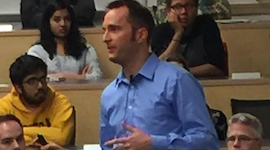
Madison Ayer, who has led several social ventures in Africa, including Honey Care Africa and Farm Shop, will discuss what he learned from those enterprises to launch Mbuyu Group, a large-scale honey bee conservation initiative. Mbuyu Group is working with South African National Parks to protect some of the world’s most critical honey bee ecosystems and strengthen the bee population. The group also hopes to become one of the largest global producers of organic honey.
Ayer has been featured in the WDI speaker series in the past. Last year, he talked about Honey Care Africa and Farm Shop, two ventures in Kenya that serve those living at the base of the pyramid.
Honey Care Africa provides smallholder farmers with beehives and harvest management services. In addition, it guarantees a market for the beekeeper’s honey at fair trade prices, helping to provide a steady, consistent source of income.
Farm Shop recruits and trains franchisees who then independently operate community-level, agro-dealer shops that supply smallholder farmers with seeds, fertilizers, tools, veterinary medicines and other items to improve crop yields.
In his 2015 talk, Ayer discussed the challenges that come with integrating low-income producers and consumers into the supply chain, including poor infrastructure, security concerns, informal regulations, and high costs. But if successful in overcoming these hurdles, Ayer said it can lead to long-term competitive advantage and positive economic impact on communities across the supply chain.
Watch Ayer’s 2015 presentation here and his interview with WDI Senior Research Fellow Ted London below:
In addition to his previous talks, Ayer also has engaged with WDI’s Scaling Impact Initiative and the Performance Measurement Initiative (PMI).
As part of a project funded by the German development agency GIZ, WDI studied the landscape of BoP facilitators in the sub-Saharan Africa region. The Scaling Impact initiative conducted field visits to Ethiopia and Kenya – including to Honey Care Africa and Farm Shop.
WDI’s Performance Measurement Initiative team also conducted a qualitative impact assessment in 2012 to identify Honey Care’s impact in alleviating poverty on children age eight years and younger, and developed a case study as part of the series entitled Focusing on the Next Generation: An Exploration of Enterprise Poverty Impacts on Children. The goal of the series, funded by the Bernard Van Leer Foundation, was to gain a greater understanding of the ways in which businesses in emerging markets impact young children’s lives and the potential to optimize impact on children.
Additionally, WDI Publishing also produced a popular teaching case study on Honey Care Africa that examined the business’s transition from obligating farmers to maintain their own hives to providing hive management services. The case also explored ways to enhance this new model, including strategies to reduce side selling. It was written by London and Heather Esper, senior program manager of PMI.
Kristin Babbie, a senior project administrator at WDI’s Grants Management team, recently attended the Global Youth Economic Opportunities Summit and authored the following post for NextBillion.net. NextBillion, a WDI affiliated site, originally published the article on Oct. 12, 2016.
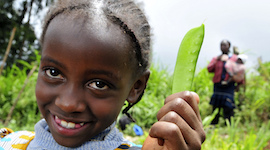
In 2013, I interviewed a group of young people at a youth empowerment center in Kenya about their perceptions of agriculture as a livelihood. The interviews were part of a study driven by concerns about Kenya’s youth bulge, coupled with anecdotal evidence that the country’s youth had negative attitudes about working in the agricultural sector. The attitudes of the youth I interviewed were shaped primarily by the significant barriers they faced in accessing the capital needed to develop agriculture-based enterprises. Indeed, my findings pointed to the conclusion that the youth and agriculture problem runs deeper than the “youth are not interested” narrative.
Fast forward to 2016 and the Global Youth Economic Opportunities Summit hosted by Making Cents International, where the youth and agriculture problem was highlighted and the simplified assumptions underpinning it – such as “youth just are not interested” – were challenged.
So why is the youth and agriculture problem a concern to international development practitioners?
For one, agriculture is the “backbone” of many sub-Saharan countries. For instance, agriculture accounts for about 70 percent of the total labor force and 30 percent of Gross Domestic Product in Kenya. Second, rural households in Kenya rely heavily on subsistence agriculture for food consumption. And third, the country’s labor market lacks the ability to meet the demand of young job seekers. The highest unemployment rates in Kenya are for 20-year-olds, at 35 percent, followed by 25-year-olds, at 25 percent.
At the Global Youth Economic Opportunities Summit’s plenary titled “Seeding the Future: Land Tenure, Technology, and Opportunities in the Rural Economy,” panelist Thomas Jayne, a professor in the Department of Agricultural, Food and Resource Economics at Michigan State University, emphasized that agriculture is not a “declining sector” in sub-Saharan Africa. Over the next 20 years in sub-Saharan Africa, he said 350 million youth will pursue employment, but even under the most favorable conditions only 25 percent will find wage-paying jobs in the formal economy. Agriculture offers a potential solution.
USAID’s Feed the Future Initiative cites the World Bank’s “Agriculture for Development” report, which makes the investment case for agriculture in developing countries. Perhaps the most compelling finding is that for people with the lowest incomes, “GDP growth originating in agriculture is about four times more effective in reducing poverty than GDP growth originating outside the sector.” Jayne presented the argument that multiplier effects offer the most significant benefit for investments in agriculture. Given the sheer size of the agricultural sector in sub-Saharan Africa in terms of number of producers, a slight increase in per capita income would have an overall positive economic impact.
“Since 2013, farmers’ sales of Feed the Future-supported crops increased 30 percent, on average. For poor farming families, this means more income to: buy more food, access healthcare, pay for school, save for & invest in the future. Economic empowerment is good for rural families, their communities and countries, and the world. It all adds up.”
Ending Hunger and Poverty: A Snapshot of Progress
Following Jayne’s talk, Odenda Lumumba, CEO of the Kenya Land Alliance, described a rural-to-urban migration trend he has observed in Kenya. Young people move to urban areas to attend school, he said, and once they are there, it is not uncommon for them to move to slums due to lack of opportunities. He implied that in many cases greater opportunity awaits youth in rural areas than in urban areas. The World Bank’s Agriculture for Development report points out that while agriculture is a driver of sub-Saharan African economies, only 4 percent of public spending is allocated to the sector. Lumumba called on governments, donors and the private sector to invest in agriculture where it can have a significant multiplier effect: “Today agriculture has the biggest opportunity to end hunger and eventually end poverty. But how do you do that? That is the challenge.”
Prior to the plenary, Beth Dunford, assistant to the administrator in USAID’s Bureau for Food Security, said that it is not that youth in sub-Saharan Africa are simply not interested in agriculture; it is that they are not interested in pursuing the agriculture of their parents. Dunford said, “Young people bring the kind of innovation, energy and enthusiasm that we need to tap into (for) transformative solutions to many of our biggest problems. Youth are interested in that, and that is what we need for agriculture.” Her message resonated with the research I did in 2013, in which youth frequently reflected on their experiences witnessing their parents’ hard manual labor. Dunford described Feed the Future’s approach to development, focused on creating enabling environments with youth – not for youth – to grow and expand their agricultural enterprises. A key takeaway message was that “there is money in the soil,” an expression Dunford heard while in Zambia.
The panel included two youth who both provided on-the-ground perspectives of how they had pursued agriculture in their home countries of Tanzania and the Philippines. First, 22-year-old Sirjeff Dennis of Jefran Agrifriend Solutions (JAS), based in Tanzania, shared his experience of growing up in a slum where finding a meal was difficult. When he saw a woman in his neighborhood lose her baby to malnutrition, it gave him the passion to end hunger through agriculture. Despite earning his degree in petroleum engineering, Dennis decided to become an agricultural entrepreneur, or “agripreneur.” Five years ago he started his company with $50 USD. He purchased 50 chickens and eventually expanded his enterprise to include maize, rice, tomatoes, Chinese cabbage, okra, eggplant and onion. On one hand, he explained, there is a common stereotype among Tanzanian youth that agriculture is something that should be done by poor people with a low level of education; on the other hand, people throughout his country really love it.
Dennis’ comments suggest that there is a cultural value to agriculture; however, there is a perception that those who pursue careers in the sector are minimally educated and are destined to be poor due to the difficulty in generating sustained incomes. To assist in debunking this attitude, Dennis created a youth and agriculture initiative within JAS, recruiting and training young people to start their own agricultural enterprises. He had hoped for 30 applicants but received 300, demonstrating the interest of youth in agriculture.
Today, Dennis’ business employs 37 people, with 80 percent of them 23 or younger – and 20 percent are women. Despite the success, he points to key challenges that threaten the sustainability of his enterprise. For one, access to finance is a significant problem for Dennis. For example, despite the exposure he gained through winning a MasterCard Foundation award, the local bank was still not willing to provide him with a loan. The reason? Because he is 22 and doing agriculture. Another challenge, he said, is access to equipment. He had to import equipment through Alibaba, an online marketplace, to scale his business, which was very expensive. Dennis recommended that the government in his country lower taxes for young farmers, provide assistance to youth to form farming cooperatives, and provide financial assistance. He stated that development practitioners must create awareness among banks and governments about the unique challenges agri-preneurs face, so that investments in agriculture make sense.
Another young agri-preneur, Cherrie Atilano, shared her perspective as it relates to a social enterprise she founded called AGREA, based on the island of Marinduque in the Philippines. AGREA leads a youth movement in support of agriculture, offers a variety of trainings and events, promotes sustainable agricultural technologies, and bridges the gap between farmers and consumers. AGREA is known for its tagline, “Making farming cool, smart, sexy, and humane.” Atilano starting farming when she was 12 years old and 18 years later, she is still involved. She said a lot of young people in the Philippines, especially professionals, are going back into the sector. There are thriving high-value markets for organic and artisan foods in Southeast Asia, she said, and the Filipino government has begun to recognize the value of agriculture. For example, a new law mandates all public and private schools visit a farm once per year as a field trip. Finance, Cherrie noted, remains the most significant barrier to young farmers working to start their own agricultural enterprises in her country.
Speakers at the summit made a strong argument for the potential of agriculture and why the development community should continue to challenge the assumptions behind the notion that youth are not interested in it. However, the transformation of structures (including government and the private sector) and processes (such as laws, policies, culture and institutions), which in turn influence ability to respond to shocks, trends and seasonality, must be addressed within the local context. These macro factors have an ultimate influence on the ability of youth to access key capital to develop, sustain and scale their agri-enterprises.
Photo by Neil Palmer (CIAT) via Flickr
After graduating from the University of Texas, Patrick Huang began his career as a management consultant while giving free advice to social entrepreneurs in emerging markets. But he soon wanted to do much more than dole out advice on the side, so Huang decided to get his MBA and join a social impact enterprise in an emerging market.
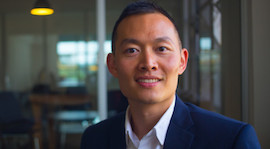
The Ross School of Business at the University of Michigan was at the top of Huang’s list of graduate schools, and “WDI was one of the key reasons,” he said.
“Ross and WDI stood out when I was applying because of its dedicated focus on the (base of the pyramid) in emerging markets through thought leadership and opportunities for students to engage directly in emerging markets through (student projects) and internships,” said Huang, now working with a startup enterprise in Kenya.
He enrolled at Michigan Ross in fall 2011 and that winter took part in a WDI-sponsored Multidisciplinary Action Project (MAP), an action-based learning course in which students work for a company or organization on a special task.
He was part of a four-person team working for the nonprofit charity CARE in Bangladesh, which was tasked with developing a micro-franchise pilot for small-scale businesses that sell agricultural inputs such as seed and medicine for livestock. The business plan included consolidation and coordination to improve efficiencies at the companies.
The team worked in a small farming town a few hours outside the capital of Dhaka. They often sat in huts and interviewed farmers and business owners.
“Although our team and our interviewees came from different sides of the world, we found common ground as we came to understand their challenges, their struggles, and most importantly, their ambitions for a better life,” Huang said.
That summer, he traveled to Mumbai, India as a WDI intern working for Village Capital, a peer-led business accelerator and investment program for early-stage social enterprises. Village Capital was planning to start two business accelerator programs, one focused on enterprises based in Mumbai and another sector-specific program for enterprises across India. Huang’s job was to recruit interested and qualified social enterprises across India to the program.
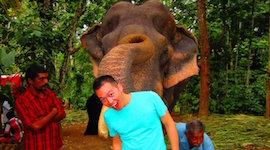
Huang poses with an elephant during his internship in India.
Huang soon discovered he not only had a knack for identifying potential businesses, he enjoyed it. He met with budding business owners, angel investors, and entrepreneur associations. He would meet them for coffee at a local cafe or for drinks during happy hour. He learned about each enterprise’s team, its business model and plans for growth.
“At the same time, I also learned about the city, the people, the culture,” he said. “I traveled across India from historical sights like the Taj Mahal to tea plantations in Kerala, absorbing and trying as much as I could. I sought to not only identify prospective businesses but also refine my own interests.”
By summer’s end, Huang had conducted preliminary due diligence and created a pipeline of 45 prospective early-stage, social enterprises.
“More importantly, I knew that I wanted to work in this environment where the growth of the entire country was almost tangible,” he said.
After graduating in 2013, Huang moved to Nairobi to work as a consultant for small- and medium-sized enterprises (SMEs). He now is chief of staff and principal business development officer at Umati Capital, a financial technology startup that provides financing alternatives for SMEs in agri-business, retail suppliers and consumer goods manufacturers in East Africa.
He said his WDI internship and MAP experiences “refined and strengthened my current passion for entrepreneurship as the driver for economic growth in emerging markets.” He also identified his role in this field – finding areas of collaboration and opportunity.
But to accomplish this with prospective clients in Kenya, he thought back to what he learned during those meetings over coffee in Mumbai and the interviews with farmers in their huts in Bangladesh. What made those projects succeed was Huang’s humility and empathy when interacting with people from a different culture or background. He also practiced “active listening” to show he was attentive and striving to understand. These are traits he applies in his work today.
“Only by understanding these lessons could I identify the common ground that served as our foundation to work together and achieve a common goal,” he said. “With my Ross MBA and my experiences at WDI, I am grateful for that opportunity, and look forward to working with businesses that can generate value for both the shareholders and the society as a whole.”
Note: This is one in an ongoing series of articles profiling past WDI interns and Multidisciplinary Action Project (MAP) team members and their career paths. Additional profiles in the series may be found here.
This study was undertaken with the financial support of the Inclusive Business Action Network (IBAN). IBAN is a global multi-stakeholder network enabling and promoting inclusive business worldwide. It is implemented by the Deutsche Gesellschaft für Internationale Zusammenarbeit (GIZ) GmbH on behalf of the German Federal Ministry for Economic Cooperation and Development (BMZ).
The focus of this report is to shed light on the opportunity for inclusive business leaders to leverage partnerships to overcome the challenges they face in seeking sustainability at scale. Our findings, based on interviews with both entrepreneurial and corporate-led enterprises engaging with smallholder farmers in Kenya and South Africa, offer important insights on how these enterprises can enhance their performance through building an effective partnership ecosystem. In particular, we focus on addressing the following two questions for IBs seeking to transition from pilot to scale:
The “who” – Which partners should enterprise leaders prioritize as most crucial to enabling sustainable, scalable inclusive business development?
The “how” – Once these inclusive business leaders have identified their priority partners, what are the strategies and processes they will need to use to develop and maintain these relationships to maximize their effectiveness?
The William Davidson Institute (WDI) at the University of Michigan received a grant from Deutsche Gesellschaft für Internationale Zusammenarbeit (GIZ) through its Inclusive Business Action Network (IBAN) initiative to implement the project, “Selecting the Right Partners: Strategies to Support Inclusive Business Scaling.” The project built on prior research supported by IBAN to further understand the process of developing robust partnership ecosystems, specifically in context of Base of the Pyramid (BoP)-oriented inclusive businesses (IBs).
The project was made up of two main stages: Stage 1, Building the Right Portfolio and Stage 2, Partnership Building. During Stage 1, the question, “Which partners should enterprise leaders prioritize as most crucial to enabling sustainable, scalable inclusive business development?” was explored. Stage 2 focused on the question, “Once these inclusive business leaders have identified their priority partners, what are the strategies and processes they will need to use to develop and maintain these relationships to maximize effectiveness?”
The William Davidson Institute (WDI) at the University of Michigan received a grant from Deutsche Gesellschaft für Internationale Zusammenarbeit (GIZ) through its Inclusive Business Action Network (IBAN) initiative to implement the project, “Selecting the Right Partners: Strategies to Support Inclusive Business Scaling.” The project built on prior research supported by IBAN to further understand the process of developing robust partnership ecosystems, specifically in context of Base of the Pyramid (BoP)-oriented inclusive businesses (IBs).
The project was made up of two main stages: Stage 1, Building the Right Portfolio and Stage 2, Partnership Building. During Stage 1, the question, “Which partners should enterprise leaders prioritize as most crucial to enabling sustainable, scalable inclusive business development?” was explored. Stage 2 focused on the question, “Once these inclusive business leaders have identified their priority partners, what are the strategies and processes they will need to use to develop and maintain these relationships to maximize effectiveness?”